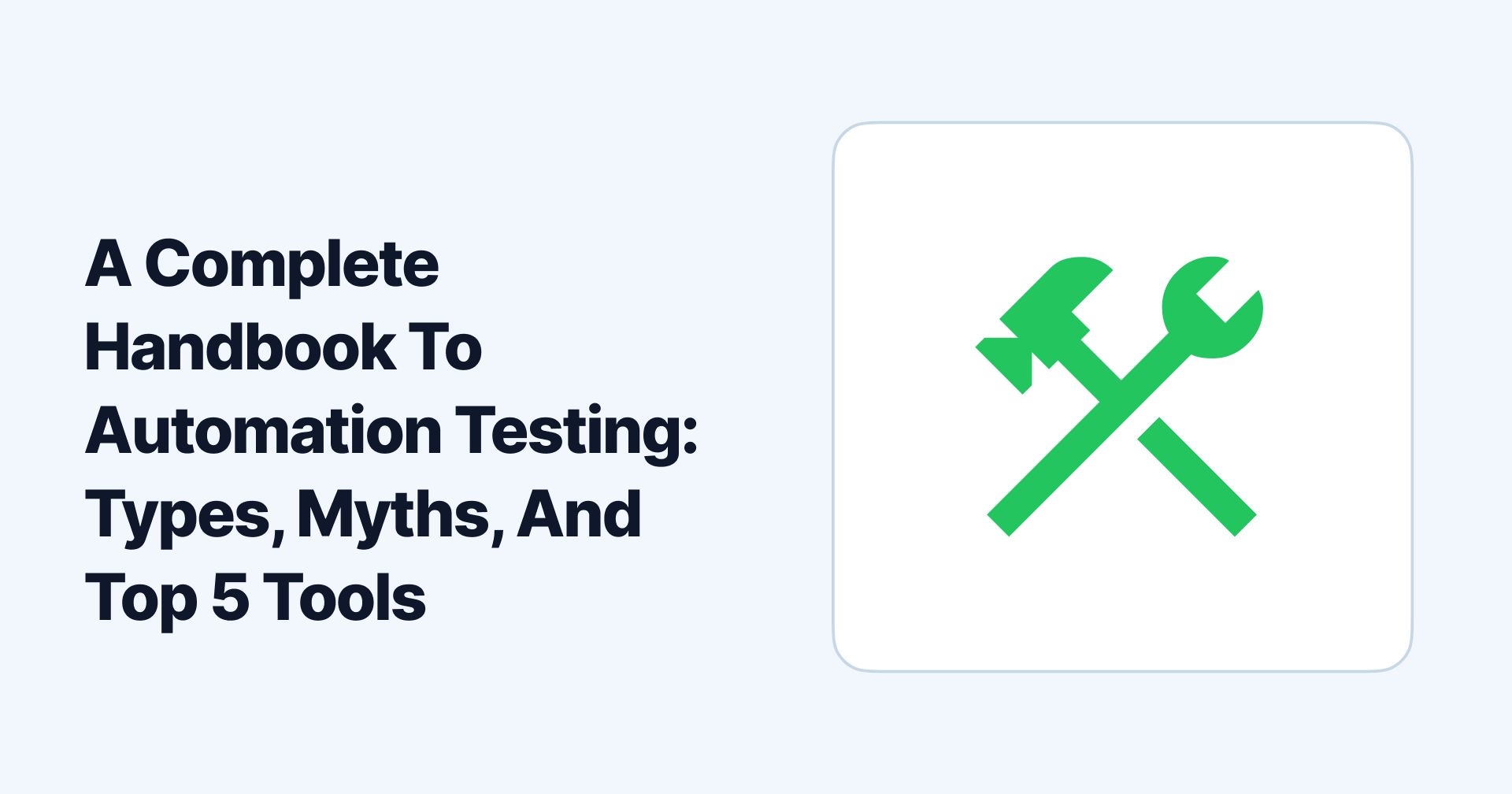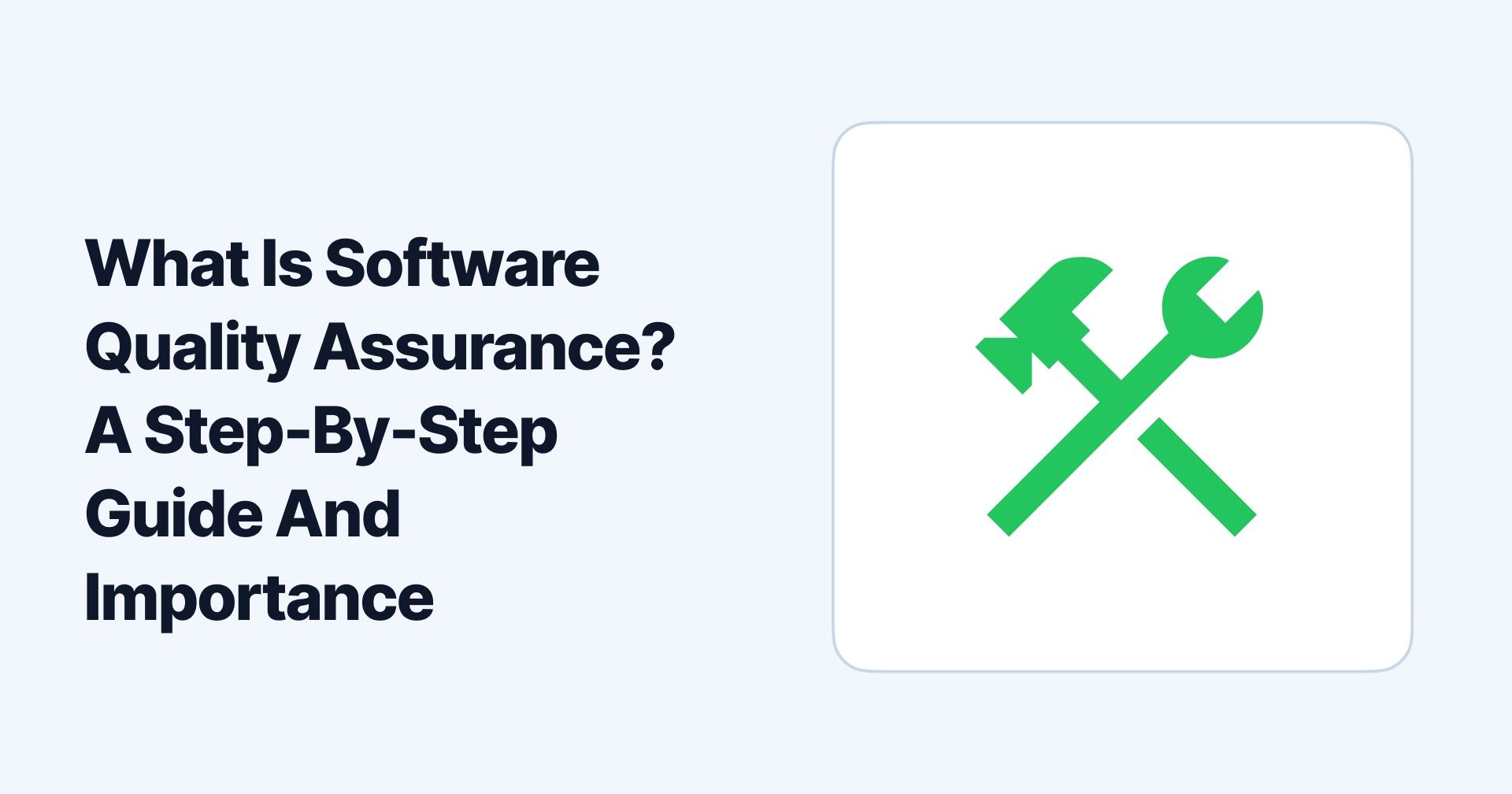As software requirements grow daily, manual testing faces challenges in efforts and scalability. With scale, there's more potential for human error again working against reliable and consistent test results.
While manual testing may be essential in understanding user experience better, developers can't carry out bulk tests manually. Therefore, it becomes crucial to automate these tests with the help of scripts.
Automation testing plays a vital role in delivering software quality quicker, acting as a helping hand to the developers. But what is automation testing? In this detailed handbook, we'll explain automation testing and its types and debunk the myths that come with it.
We'll also provide an overview of the top five platforms to help automate tests in your CI/CD pipeline for quality assurance. Let's get right into it!
What is Automation Testing?

Software testing with the help of specialized scripts or tools to execute test cases for quality assurance before it is released into production is known as automated testing. Automation testing helps run large or repetitive tests faster without human intervention.
The flow of execution is controlled by the automation software you use as per the scripts. The results are then compared with the expected outcomes to decide whether the code will go further into production.
Types of Automation Testing
Automation testing can broadly be categorized into three categories: types of testing, type of tests, and phase of testing.
Types of Testing
- Functional tests focus on the real-world testing of a software solution.
- Non-functional tests address issues like performance and data security, and storage.
Type of Tests
- Smoke Tests: These functional tests cover critical features to ensure that further testing can proceed smoothly without encountering major issues.
- Integration Tests: Integration tests combine individual software components and functionalities to ensure smooth operation between them.
- Regression Tests: These involve a combination of functional and non-functional tests to check if the software still performs expectedly after a change.
- Security Tests: Completing functional and non-functional aspects, security tests evaluate software security.
- Performance Tests: Primarily non-functional, these tests evaluate responsiveness and stability under varying loads and stress.
- Acceptance Tests: These functional tests gauge the software's acceptability to end users and are generally the final tests before release.
Phase of Testing
- Unit Testing: This initial phase tests individual software components and is usually conducted manually by developers but can be automated as needed.
- API Testing: The Application Programming Interface (API) acts as a bridge between different systems, and this testing phase ensures smooth integration between systems and software.
- UI Testing: At the end of the process, user interface (UI) testing examines what end users interact with. Testers conduct this phase after the UI has been developed, optimizing the business logic and replicating user experience.
Why must you consider automated testing? Let's discuss:
Benefits of Automation Testing
Automation testing does require initial tool selection and training investment, but the long-term benefits outweigh the costs. Here are some:
More test coverage
Time and resources may limit manual testing and automated tests can execute many test cases in a relatively shorter time. This allows for a more comprehensive detection range of defects and potential issues, improving the overall quality.
Accurate
There is less to no manual intervention while running the test cases, so the scripts can consistently execute the tests precisely. Once a test script is developed, it will perform the same actions and checks every time it's run.
Chances of overlooking defects are minimized, and the same test conditions (where required) are applied consistently across different test cycles.
Cost efficiency
This should be evident now; automation helps reduce the efforts and resources required to execute repetitive tasks, reducing the need for a manual testing team.
As the software evolves, automated scripts can be easily updated and reused, minimizing the resources required for regression testing and allowing teams to focus on more complex scenarios.
Reduce workload
Automating repetitive test cases frees testers' time to focus on more exploratory and critical testing.
Manual testers can use their expertise to explore edge cases, usability issues, and problems requiring human judgment, improving the testing process. The division of labor between automated and manual testing results in more efficient use of testing resources.
Reusable test scripts
Automated test scripts are reusable assets used across multiple testing cycles and projects. Once a script is developed for a specific test case, it can be adapted and reused to test similar functionalities in future projects. This way, the subsequent releases can be accelerated.
Automation testing may seem like a solution to all your testing problems, which it may not be. There are common myths about automated testing that we will debunk today.
Common Myths Related to Automation Testing
If you're wondering whether to automate test cases or not because of these myths, let us explain them to you:
It eliminates the need for manual testing

While automation testing does reduce the need for manual testing, it doesn't 'eliminate' or replace it.
Specific tests that require human intuition, like exploratory and usability tests, yield accurate results when tested manually. Automation works best when handling repetitive and time-consuming tasks.
It catches all bugs

Automated tests are helpful in the repetitive and consistent execution of test cases, but it's not guaranteed to catch all bugs. Tests are designed based on the information available during their creation.
Existing tests may not cover new bugs, changes in requirements, or edge cases. Testers often bring creative thinking and adaptability while testing, which helps uncover unexpected issues that automated tests might miss.
It doesn't require human involvement

Automation testing reduces the manual effort required for repeated tests but still requires human involvement at various stages.
Test script creation, maintenance, and test results analysis involve human decision-making and expertise. Automation requires continuous monitoring and adjustment to ensure the relevance and accuracy of test scripts over time.
It is quick and easy to set up

Setting up an effective automated test framework is not always quick and easy. It requires careful planning and designing test scripts, selecting the right tools, and dealing with technical issues.
The initial setup does take some time and resources. Ongoing maintenance is also required to keep the automation suite up-to-date with changes in the application and codes.
Tests are always stable across build versions

Automated tests can become unstable when the application undergoes changes or updates. A common myth is that it will work flawlessly across all future software versions once you've automated a test.
But the truth is changes in the application's UI, functionality, or underlying architecture can lead to test script failures. Regular updates and maintenance are required to ensure that automation tests remain accurate and reliable as the software evolves.
Automated manual testing (where required) ensures the best software quality. You cannot rely on any one of these alone. That said, automation testing reduces workload and saves time, which can be used for other (better) purposes.
Top 5 Automation Testing Tools
Picking the right tool requires a detailed understanding of your requirements, budget, teams’ capabilities, and resources. You also might need an effective strategy to evaluate these platforms based on your needs.
A good platform should fit your budget, have all the features you require, and should integrate with your existing tools. Let us explore the best five to find which suits best:
1.Selenium

Selenium rolled out in 2004 and has been one of the most popular open-source frameworks for software testing automation ever since then.
Selenium supports multiple programming languages like Java, Python, C#, and more, giving developers the flexibility to choose the language they are most comfortable with. Selenium's suite of tools consists of three products:
- Selenium WebDriver
- Selenium IDE
- Selenium Grid
One of the key components of Selenium is the WebDriver, which provides a programmatic interface to interact with web browsers.
This allows automation scripts to control browser behavior, capture elements on a web page, and perform actions as if a human user were interacting with the application.
Selenium's versatility and extensibility have led to its widespread adoption in the software development industry, playing a vital role in maintaining application quality and accelerating the testing process.
Features
- Selenium allows you to write test scripts that can be executed across various web browsers such as Chrome, Firefox, Edge, Safari, and more.
- Developers and testers can write scripts in the language they are most comfortable with, which makes it easily accessible for different teams.
- Fine-grained control over browser behavior improves the accuracy and reliability of test scripts.
- Selenium supports parallel test execution, which means you can run multiple test cases simultaneously on different browsers.
- Selenium can be easily integrated with testing frameworks such as TestNG, JUnit, and NUnit.
Pricing
Free
2.Appium

Appium is an open-source automation tool designed to test mobile applications across iOS, Android, and Windows platforms. It provides a consistent and standardized way to automate mobile app testing.
This makes it easier for software developers and testers to ensure the quality of their mobile apps. What sets Appium apart is its cross-platform compatibility. It allows you to write and execute tests using the same API and scripting languages across various mobile platforms.
This means you can use a single set of test scripts to test your app on different devices and operating systems. Appium works by interacting with the user interface elements of the app, just like a real user would.
It uses the native automation frameworks provided by each platform (such as XCUITest for iOS and UI Automator for Android) to drive the app and perform actions like tapping buttons, entering text, and verifying elements.
Features
- Appium supports multiple programming languages, such as Java, Python, JavaScript, Ruby, and C#, allowing testers and developers to work with the language they are most comfortable with.
- Appium supports both native and hybrid mobile applications. It interacts with the app's native UI elements and web views, simplifying the testing of different app types.
- It allows testing applications on real devices and emulators/simulators.
- Unlike some other automation tools, Appium doesn't require you to modify the app's source code to enable testing.
- Integrations with different testing frameworks and CI/CD tools.
Pricing
Free
3.Katalon Studio

Katalon platform is an automated testing tool developed by the Katalon studio for web, API, and mobile apps, built on the Selenium WebDriver.
It offers both a codeless automation mode, suitable for testers with limited coding experience, and a scripting mode for those who prefer to write their test scripts using languages like Groovy or Java.
Katalon Studio also stands out for its integrations and plugins that enhance its functionality. It supports integration with popular tools such as Jenkins for continuous integration and delivery and Jira for issue tracking.
Its plugin ecosystem allows users to extend the tool's capabilities, enabling custom integrations and addressing specific testing needs.
Features
- Automatically runs failed tests and self-healing mechanisms.
- Cross-browser and cross-platform testing.
- Scales up to meet your demands.
- Object repository to store and manage web elements, making it easier to maintain and update test scripts as the application's UI changes.
- Detailed documentation.
Pricing
- Free- $0
- Premium- $167/ month billed annually
- Ultimate- Custom
4.Tricentis Tosca

Tricentis Tosca is an automation testing tool for automating end-to-end testing for enterprise applications. Tosca can create and execute automated tests for web-based and desktop applications and mobile apps.
Tosca offers model-based test automation, where tests are created based on visual models of the application's components and user flows.
This abstraction allows testers to design and maintain test cases more efficiently, as changes in the application's UI or underlying code can be updated more easily in the models without significant script modification.
Features
- Build codeless, resilient automated tests.
- Test data management helps you create and provision on-demand (synthetic, masked, or imported) stateful data for even the most complex scenarios.
- Create, maintain, and run virtualized services in minutes.
- Accelerate testing cycles with distributed test execution.
- Run web accessibility testing early in your development.
Pricing
5.Allure Testops

Allure Testops is an end-to-end test automation and management platform designed to simplify and keep control of your manual and automation testing. It offers a comprehensive, user-friendly solution that simplifies test management throughout the SDLC.
It simplifies test execution by providing real-time progress and valuable insights into software quality. Allure Testops also provides native integrations with various testing frameworks and CI systems, supporting multiple programming languages.
Features
- You no longer have to manually update your test cases after each test run with Smart Test Cases. Allure TestOps automatically refreshes your test documentation based on results tracking and analysis.
- Allure TestOps integrates seamlessly with tools such as Jenkins, Bamboo, GitLab, and GitHub, allowing you to incorporate automated testing into your CI/CD workflow.
- Allure TestOps is designed to scale with your needs. Whether there are 1,000 test cases or 1,000,000, the tool can handle the execution of tests smoothly.
- You can create custom metrics and Key Performance Indicators (KPIs) using Allure Query Language to monitor and track project progress at a glance.
- Allure Report is another versatile product that generates visually appealing and comprehensive test reports.
Pricing
Allure Testops offers two plans- Cloud and Server. Pick your plan and try it yourself without committing to anything; you don’t need a credit card to sign up for the free trial.
Cloud-
- Hosted on Allure's infrastructure.
- $39/ month per user or fewer.
- Secure AWS hosting.
- 60 GB storage included.
- Monthly or annual billing.
- From 1 user.
- Get 14-day free trial.
Server-
- Hosted in-house.
- $30/ month per user or fewer.
- Full control over your instance.
- Private services integration.
- Quarterly or annual billing.
- From 5 users.
- Get 30-day free trial.
How is Allure Testops better than others?
Other than its extensive features and integrations, here’s what sets Allure Testops apart from its competitors:
- It allows you to write your own tests or integrate Testops with an existing test base without making any changes in the code.
- Testops allows you to run tests selectively by controlling the execution of tests on CI servers.
- All the info on your particular launch is updated in real time as the results come in.
- Testing frameworks (like TestNG, Jest, or SpecFlow) can automate re-runs on failed tests for you. You can also selectively run just the failed tests.
- In Allure Testops, automated tests look and feel like manual tests. So, anyone unfamiliar with automated testing (manual testers, managers, etc.) can still work with those tests.
Conclusion
We hope we’ve helped you better understand automation testing by highlighting its benefits, types, and five myths that may mislead people. Automated testing is an integral part of a CI/CD pipeline that ensures no faulty code goes further into production.
It has become more like a necessity to automate specific tests to meet the rising demands of the IT industry. Test automation tools can significantly ease the process by managing test runs and providing detailed insights into test results.
Allure Testops is a platform with powerful analytics and comprehensive test management features for your DevOps teams. Your teams don’t need to be pro at automated testing, as they might not even feel the difference.
It helps ensure software quality by automating repetitive tasks and integrating with your existing CI/CD tools. You can try its features risk-free for 30 days on our server and 14 days on our cloud. Change the way you run automated tests with Allure Testops!



